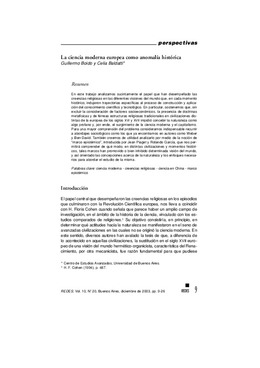Mostrar el registro sencillo del ítem
La ciencia moderna europea como anomalía histórica
Modern european science as historic anomaly
| dc.creator | Boido, Guillermo | |
| dc.creator | Baldatti, Celia | |
| dc.date.accessioned | 2017-09-22T14:57:06Z | |
| dc.date.available | 2017-09-22T14:57:06Z | |
| dc.date.issued | 2003-12 | |
| dc.identifier.citation | Boido, G., Baldatti, C. (2003). La ciencia moderna europea como anomalía histórica. Redes, 10(20), 9-26. | es |
| dc.identifier.issn | 0328-3186 (impresa) | es |
| dc.identifier.issn | 1851-7072 (en línea) | es |
| dc.identifier.uri | http://ridaa.unq.edu.ar/handle/20.500.11807/565 | |
| dc.description | Fil: Boido, Guillermo. Universidad de Buenos Aires. Centro de Estudios Avanzados; Argentina. | |
| dc.description | Fil: Baldatti, Celia. Universidad de Buenos Aires. Centro de Estudios Avanzados; Argentina. | |
| dc.description.abstract | En este trabajo analizamos sucintamente el papel que han desempeñado las creencias religiosas en las diferentes visiones del mundo que, en cada momento histórico, indujeron trayectorias específicas al proceso de construcción y aplicación del conocimiento científico y tecnológico. En particular, sostenemos que, sin excluir la consideración de factores socioeconómicos, la presencia de doctrinas metafísicas y de férreas estructuras religiosas tradicionales en civilizaciones distintas de la europea de los siglos XVI y XVII impidió concebir la naturaleza como algo profano y, por ende, el surgimiento de la ciencia moderna y el capitalismo. Para una mayor comprensión del problema consideramos indispensable recurrir a abordajes sociológicos como los que ya encontramos en autores como Weber y Ben-David. También creemos de utilidad analizarlo por medio de la noción de “marco epistémico”, introducida por Jean Piaget y Rolando García, que nos permitirá comprender de qué modo, en distintas civilizaciones y momentos históricos, tales marcos han promovido o bien inhibido determinada visión del mundo, y así orientado las concepciones acerca de la naturaleza y los enfoques necesarios para abordar el estudio de la misma. | es |
| dc.description.abstract | In this paper, we briefly examine the role that religious beliefs have played in the different worldviews that, in each historic period, have induced specific courses in the process of building and implementing scientific and technological knowledge. In particular, we maintain that, without excluding socioeconomic factors, the presence of metaphysical doctrines and of tight traditional religious structures in civilizations other than the European one of 16th and 17th centuries prevented them from conceiving nature as something secular and therefore hindered the emergence of modern science and capitalism. To reach a better understanding of the problem, we think it is essential to resort to sociological approaches, such as those used by Weber and Ben David. We also think it is useful to analyze the problem by means of the concept of "epistemic framework" introduced by Jean Piaget and Rolando García because it would allow us to understand in what way those frameworks have, in different civilizations and in different historic periods, promoted or hindered a certain worldview and thus have orientated the notions about nature and the approaches necessary for its study. | es |
| dc.format | application/pdf | es |
| dc.language | spa | es |
| dc.publisher | Universidad Nacional de Quilmes | es |
| dc.rights | https://creativecommons.org/licenses/by-nc-nd/2.5/ar/ | es |
| dc.source | Redes | es |
| dc.subject | Ciencia | es |
| dc.subject | Conocimiento | es |
| dc.subject | Creencias religiosas | es |
| dc.subject | Europa | es |
| dc.subject | Filosofía de la ciencia | es |
| dc.subject | Science | es |
| dc.subject | Knowledge | es |
| dc.subject | Religious beliefs | es |
| dc.subject | Europe | es |
| dc.subject | Philosophy of science | es |
| dc.subject | Ciência | es |
| dc.subject | Conhecimento | es |
| dc.subject | Crenças religiosas | es |
| dc.subject | Filosofia da ciência | es |
| dc.title | La ciencia moderna europea como anomalía histórica | es |
| dc.title | Modern european science as historic anomaly | es |
| dc.type | info:ar-repo/semantics/reseña artículo | es |
| unq.blm.ubicacion | P-AR-RED1 | es |
| unq.articulos.paginicio | 9 | es |
| unq.articulos.pagfinal | 26 | es |
| unq.revista.numero | 20 | es |
| unq.revista.volumen | 10 | es |
| unq.version | info:eu-repo/semantics/publishedVersion | es |
| unq.articulos.seccion | Perspectivas | es |
| unq.tipo.snrd | info:eu-repo/semantics/article | es |
| unq.acceso | info:eu-repo/semantics/openAccess | es |
Ficheros en el ítem
Este ítem aparece en la(s) siguiente(s) colección(ones)
-
Vol. 10, no. 20
Publicada en diciembre de 2003.

